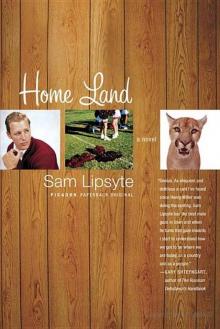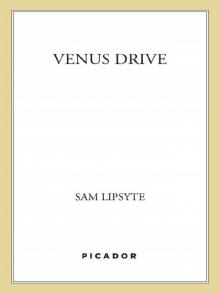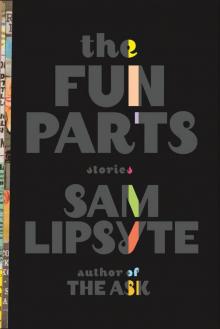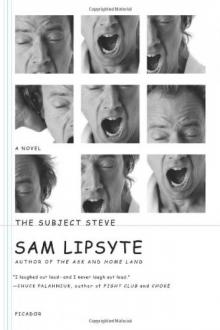- Home
- Sam Lipsyte
Venus Drive Page 4
Venus Drive Read online
Page 4
The counselor with the stroke books tortured Van Wort, too. He was just a mean kid with more years on him, more muscles, a denser perm. He wore a spoon medallion. His name was Steve, or maybe Ivan, and his stroke trunk was deep. When we got through the first batch he hauled out some more. These were magazines that didn’t even have real magazine names. They just said what was in them, the way creamed corn at the market just said creamed corn on the can.
Steve-Ivan called Van Wort Van Wort Hog. Or Fat Fucking Shit, for short. He was the one who told us to piss in Van Wort’s canteen. It was the best canteen in the bunk, brand new, fuzzy wool, a cavalry sleeve. We took turns pissing in it and dipping it down in the Port-O-San hole. We left it under his short-sheeted bed.
When he found it his eyes went dark, his great arms started wibbling, wobbling on his knees. The canteen, he told us, was a gift from his dead father.
“It’s just a joke you fat fucking shit,” said Steve-Ivan. “We’re your friends.”
“Really?” said Van Wort. He looked as though he was ready to believe this, or wanted to be ready.
“Sure,” said Steve-Ivan. “Just don’t be a Van Wort Hog and run crying to Mr. Marv.”
Van Wort stopped crying and he didn’t run but he went to see Mr. Marv. Steve-Ivan was somebody’s cousin near Canada, though. The whole thing blew, as they say, over.
I got damn good at boxball during this period. I was, if you will, the boxball king. Maybe it’s not crucial to the story of Van Wort, but I think people should know.
We did a camp-wide Capture-the-Flag. I wasn’t in Van Wort’s unit, but I can tell you things got pretty hairy out there. What happened to this one girl in the beet field was a shame. We never did know what the rules were, or which kids were still living or dead. My unit just marauded around. We laid waste to Mr. Marv’s azaleas and tied a boy to the tetherball pole. Then we lucked into view of the flag, this dinky fluorescent thing like the kind for a sissy bar, planted on a hill. Mr. Marv was up there with some other campers.
“Don’t let the heathens flank us, you curs!” we heard him shout.
We flanked them hard. We flew up along a ridge near the tennis courts. Van Wort appeared out of nowhere with a croquet mallet in his hands. Some of us batted the mallet away and beat Van Wort to the dirt. I led the rest of the unit on the resumed flanking maneuver. I didn’t want to know what they were doing to Van Wort.
Mr. Marv noticed our wild charge a little too late.
I lowered my head, took flight.
“The day is lost!” he said, as I hit. “Our Lord has forsaken us for vile Moors!”
“Vile Moors,” he kept saying, which I didn’t get at the time, but I see now was because we had Black Sean with us and it was Black Sean who took the flag.
Then the agony of having your nuts crushed by an airborne boy, it must have suddenly arrived on Mr. Marv. The man shut up.
Victory equaled a sack of candy bars, to be divided evenly among all living members of our unit.
Van Wort spent the night in the infirmary, though a boy who was there for a spider bite said there were no visible marks.
We played Freeze-Please every breakfast, lunch, and dinner. Steve-Ivan would say “Freeze, Please” while we were eating and we’d all go stone-cold statue. Whoever moved first was Admiral of the Swiss Navy, which meant you had to scrape and stack the dishes, bus them over to Black Sean’s mother in the kitchen.
The Swiss have no navy, but who knew that then?
We called Van Wort the Commodore because he couldn’t hold still. I think it was unfair, really, because it wasn’t so much him as his fat that was moving, if that makes any sense at all. Study a fat kid hard and it might.
“Well, it looks like another lucky day for the Hog,” Steve-Ivan said one morning.
“I’ll help him,” I said.
Everyone gawked, as though I’d been struck with sudden bolts of faggot lightning, but it was just this feeling I had, that Van Wort was getting a bad break.
He wasn’t so off. He wasn’t even weird. It wasn’t like he wrote bird poems or wore the wrong kind of underwear.
“Why are you doing this?” said Van Wort.
“Just because.”
“I don’t care what you do to me,” said Van Wort. “If it’s a trick, it’s a trick.”
We were quiet and stacked for a while.
“So,” I said, “who killed your dad?”
“Nobody killed him,” said Van Wort. “He dropped dead. I saw it.”
“No shit,” I said. “You saw it?”
“He went blue and had a bubble on his mouth.”
“What’d you do?”
“I didn’t do anything.”
“Didn’t you give him mouth to mouth?”
“He had a bubble there.”
Some of us were smoking behind the Port-O-Sans after lights out when Steve-Ivan wandered by. We had figured him for off to the bars on the highway by now.
“Hey, it’s lights out,” said Steve-Ivan.
“We know,” I said.
“That means lights out out.”
“I said we know,” I said.
“Don’t wise off to me,” said Steve-Ivan. “You think you’re special just because you’ve been going for those hog rides?”
This was wit near Canada. The boys did a round of barnyard jokes about me and Van Wort.
“So, what’s it like, sucking on the bacon?” said Steve-Ivan.
They called me Bacon from then on.
I didn’t mind the cracks, but I missed the camaraderie.
I calcified, got crusty. I lost my boxball crown.
Each night they came to his bed where he lay wheezing. It wasn’t even foot powder and Indian burns anymore. They wanted to hurt him, to make him bleed. They taped him down to the bed frame, went at it with tweezers and pocket knives. They got his sock bunched up for a ball gag. They pinched off pieces of him with nail clippers and tiny sewing shears from kits their mothers had packed because it was on the list.
I’d get up and walk to the other end of the bunk until they were done.
In the morning I’d help him clean up, wipe down the blood until it was just dark nicks.
We talked about everything except what they did to him.
We talked about the day’s activities, the boats, the beads, the weaving. We talked about our dreams the night before.
He told me he had gun dreams where the gun wouldn’t shoot, falling dreams where he fell into a stilled river that had his father’s face in its bed. He had one where all the girls at the girls’ camp were rolled out on a float for his fancy. I told him he should keep a dream diary and he told me he did, showed me a spiral-bound notebook with his entries. It read:
GUN
GIRLS
RIVER
RIVER
RIVER
He told me he had given the eulogy at his father’s funeral, that it was easy, he’d just used an essay he’d written for school and substituted “my father” for “our founding fathers.”
I started to admire Van Wort. But then I’d hate him for being so weak. He’d given up even the shrieking and they rarely bothered to gag him anymore.
“Why don’t you fight back?” I said.
“What’s the point?”
“The point is you show them you’re not a pussy. Then they leave you alone.” I believe I’d first heard this argument advanced by a talking beagle on one of those claymation shows the Lutherans used to produce.
“Will you help me?” he said.
“No,” I said. “That would be wrong.”
“Why?”
“It’s complicated,” I said.
Then it was the last day of camp. We packed all our stuff in duffels. Tomorrow we would strip our beds and get into our family wagons, wave.
At our last lunch Steve-Ivan said that Van Wort and I would be voted camp love-birds at the camp banquet that night.
“Vote us whatever the fuck you want,” I said.
“Oh
, you little bitch,” said Steve-Ivan.
We had to stack without even a Freeze-Please and Van Wort wouldn’t look at me.
“What’s wrong with you?” I said.
“I’m done with this,” said Van Wort.
I took that to mean that he was going to do something, make himself the last of the brave. What he meant, though, was that he was truly done. Van Wort took a canoe out to the middle of the lake. We were doing free swim and we heard him call to us, watched him drink from a big plastic jug and just sort of bend over, roll off the bow into the lake. You’d figure drowning would be hard going to begin with, all that lung smash and lung stove and no air to dream of rivers anymore, but picture it with your guts burning off from a stolen jug of kitchen lye. Steve-Ivan dove in to save him but Van Wort was too fat. We watched them bob together in the middle of the lake. Then Steve-Ivan was bobbing up and down alone. He swam back weeping, or maybe it was the water.
They got Van Wort’s body out with a special boat. They had him in a strap swinging off the gunwale. His swim trunks trailed out from his feet and you could see all the night wounds on him.
“Self-mutilation,” said Mr. Marv. “Interesting.”
The news trucks drove up that afternoon.
Van Wort’s father appeared, too. He was a skinny man in a sun hat. He stood on the shoreline shouting at no one in particular. I walked up to him.
“I’m Bacon,” I said. “I was his friend.”
“Were you his Judas, too?” said Mr. Van Wort. He busted me a tough one on the jaw. Then he took me to his bony chest.
“I didn’t mean that,” he said. “I know you were his friend. Bobby wrote me about you.”
I had long forgotten Van Wort was also a Bobby, if I ever knew.
I wonder if his father saw me on the newscast that night.
“Friend of the Victim,” they flashed across my heart.
I was voted Most Humane at the camp banquet. Black Sean was Leadership Qualities. His mother cried. Steve-Ivan got up with a God’s Eye he claimed Van Wort had woven for him and Mr. Marv led us in a Moment of Silent Reflection.
Van Wort, Mr. Marv told us, had touched all of our lives.
He may have just been talking, like he did about the bone spurs, but he was also right. I put on a ton of weight in school that year, got jumped and beat in my town a lot. It felt good, like I was getting free of something, but I never let on that I was enjoying myself. Then I found a severe diet, sought welcome from a band of semi-evil people. We were all nearly beautiful and eager to destroy each other for it. I had the kind of time where you don’t notice the time going by, but it did.
Ergo, Ice Pick
Someday, I shit you not, we are going to smash the state. We are going to smash it good. We’ve got time on our side. We are up in the hills with time on our side, and time’s pal, history, is pulling for us, too. Martin says it, and I believe it. What’s not to believe? What is to be done will be done.
Up here, we are so far from our old homes. We are so far from where inside our old homes are mothers and fathers and TV’s to believe, shiny bars to hang towels from, bottles of things to wash our hair with and soften our shirts. We are far from the campus, too, where maybe I was out of my league, or maybe they were out of mine. Damn them, the ones on campus, and the ones in town. They walk around like everything is howdy-dory. They are blind to everything they cannot see. Soon as I heard about smashing the state, I was in. You don’t have to convince me the smell I’m smelling is the stench of the state. Look around, sniff it—the coffee, the roses, the rot, the aroma.
Up here, we must beware. We are safer in the hills but we are not safe. The long arm of the law is bendy and long. All we can do is wait. We are waiting and we wait.
Some days, Martin and me, we shoot the shotgun over the landlord’s roof. Some days we get in the truck, go four-by-four on the pond road when it ices, skitch it. Every day we cut the trees where they grow thick on the ridge. Martin cuts them and I haul the wood to the road. The landlord says to cut what we need for heat. The forest, it comes with the rent. But we always cut more for barricades, for bonfire fuel.
The barricades are for the revolution, the bonfire fuel for bonfires, which the landlord forbids, that fucking kulak.
We like to skitch and we like to loaf, but we can only do it until Martin’s wife Lucy comes home. Then we have to look busy. Lucy says the revolution, for revolutionists, is twenty-four-seven, but most days Lucy goes off in her blood-technician whites. Me and Martin, we drive out for a snack.
“Doing hillbilly shit is a good stress reliever,” says Martin.
“Look at Trotsky and his opera,” I say, “I mean Bronstein. Look at Bronstein.”
We are watching our pie cool at White Power Pizza. White Power Pizza is also called Hank’s, after Hank Krull, the owner, but if I say to Martin, after a long day of kulak-roof-buckshot-lofting, or pond-road skitching, or pond-ice sliding, “Hey, let’s go to Hank’s,” he has no idea what I might mean, but if I say “White Power Pizza,” we are four-by-four with all due speed.
We are watching our pie cool and feeling the coolness of glances from Hank and his White Power Pizza men. They are boys, really, fallen from football glory, with iron crosses on their floury arms, tiny tears inked under their eyes. Every pseudo-hillbilly in a fabric-softener-softened shirt knows the meaning of this cooling glance. It’s the one that comes before the knuckle-dusters, the brickbats, the blackjacks, or those funny circle blades for slicing pies.
“What the hell are you looking at?” says Hank.
“Just watching a pro at work,” Martin says.
“The key is to keep the ovens clean. They had a problem with that in Poland.”
Hank winks, shoots us a little Nuremberg number with the flat of his hand.
Every revolutionist is a student of the odds, says Lucy, or maybe Bronstein said it first. It’s a truth every Bronstein better heed.
We abandon our perfect pie, hurry out to the truck. We drive back up the pond road, past the landlord’s house. You can see her through the window with her sons, small and sandy-headed darlings, sitting like a family yuletide greeting while she reads to them from one of those big-assed animal toddler books, the kind where hippos lecture on democracy.
“Fucking kulak!” I scream, my voice lost to wind.
Brothers and sisters, we are compound-bound.
The compound is our little house off the forest road. I love our little house, the graveyard beside it, the woods all around. I love to stagger out and piss in graveyard snow. I stare up at the moonpie moon, or dream of the little girls buried at the treeline under crooked stones. They died of typhus in the age of Millard Fillmore, my favorite president from that special time when I had to memorize those ruffle-throated men. Maybe our house is haunted, but it only makes me love it more, the whine and shudder of floorboard and strut. It’s all grained up with ghostliness. I love the iron hook I carry for the hauling of the wood that Martin cuts. It is hooked in my coat for readiness.
I love to play with the little minds of the sandy sons when they come over, curious.
Also, I love Tina, in my sleeping bag, up in the attic room. Good, sweet Tina with so much to give to the world and giving it to me, sleepytime hummers and wake-ups, too.
But don’t get me wrong. Most of all I love the revolution. Maybe I’m just tired of the wait.
The landlord thinks we are communists. We are not communists. What could a kulak, with her damn hippos, know? Communists? Sure, there are some around, the next town over. We saw them once at White Power Pizza, dumber than fence-holes, yacking their excuses for Misters Stalin and Mao. Not us. We say forget it after Bronstein got it. A clusterfuck from then till now. That is our tendency, as Martin says.
Me, I tend to say, “Let’s get the twelve gauge,” or, “The pond road is totally iced. Let’s ride.”
Martin tends to need persuading. Martin tends to pour more coffee and talk about Bronstein. He loves the pointy-bearded man so
much, he says his born name. Bronstein, Bronstein, Bronstein. Bronstein does Siberia, Bronstein smites the pesky Kronstadt sailors, Bronstein peers through learned spectacles into the dark tomorrow.
“Bronstein had Hitler pinned,” says Martin. “He knew what was coming. He figured Stalin out, too. Ergo, ice pick.”
I can’t help but like the ice pick part. I can see the skullmeat in the garden.
There’s a winter’s worth of wood already, but we keep the maul and wedge out front with some scraps to whack at for when Lucy drives up. While we make our preparations, drink down our vodka-and-Gatorades near the scrap-whack part of the yard, the little kulak boys come over. They are miniature soldiers, future sausage casings of the pork apparatus. They sit smug on our stump chairs, as though they own them, which in the world as it is, as opposed to how it could be, they do. I throw a bag of shake and a packet of extra-wides into the lap of the older one.
“If you can roll it, you can smoke it,” I say.
“I’m ten.”
“Happy birthday,” I say.
“It’s not my birthday.”
“Then happy nothing,” I say
“Everywhere,” says Martin, lowering the maul to the grass, “there are children younger and fiercer than you, ready to shuck the yoke of oppression.”
“The yolk is too runny,” says the smaller sandy son.
“That’s the point, little man,” I say.
“What’s the hook for?”
“For the gruesome necessaries,” I tell him.
“Mom says she’s going to evict you.” says the older son to Martin.
“Do you believe the hippos operate under false consciousness?”
“Mom said the university kicked you out because you were crazy, and your friend here because he was dumb.”
“Don’t you see the crisis built into late hippo capitalism?” says Martin. “There’s nothing idealistic about it. It’s fucking math.”
“Don’t curse-word me,” says the boy. He hands the shake and papers to his smaller kulak brother.

 Home Land
Home Land Venus Drive
Venus Drive The Fun Parts
The Fun Parts The Ask
The Ask The Subject Steve: A Novel
The Subject Steve: A Novel